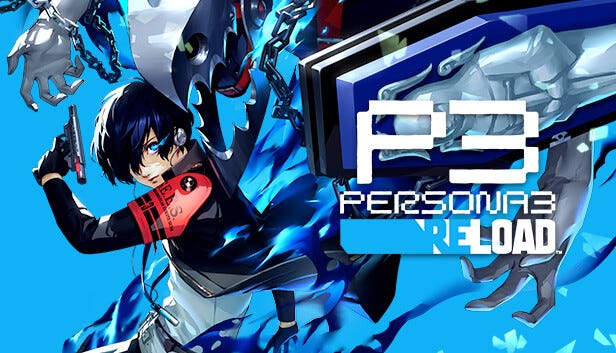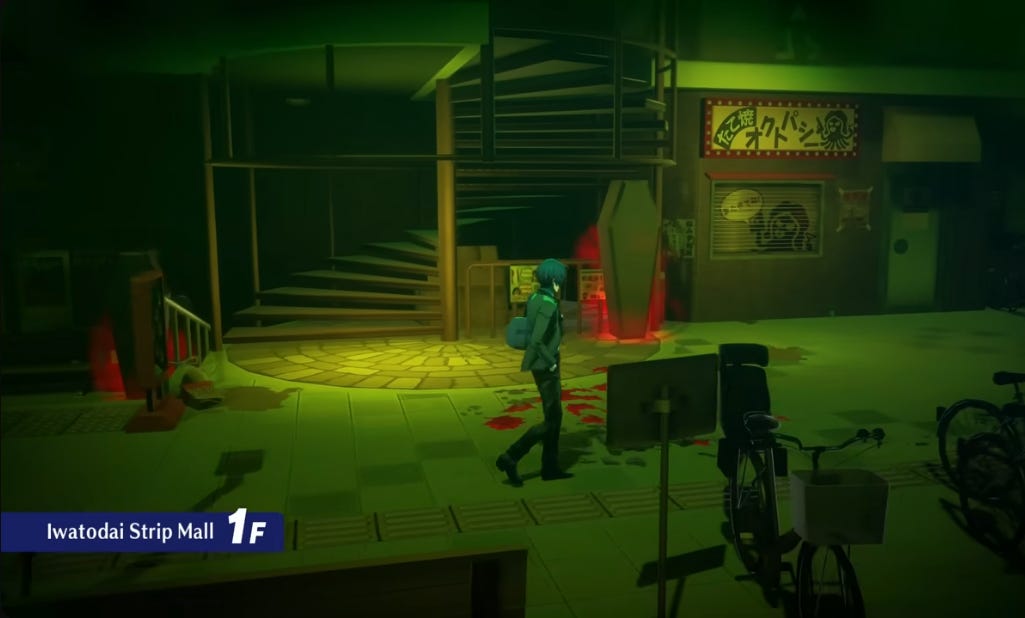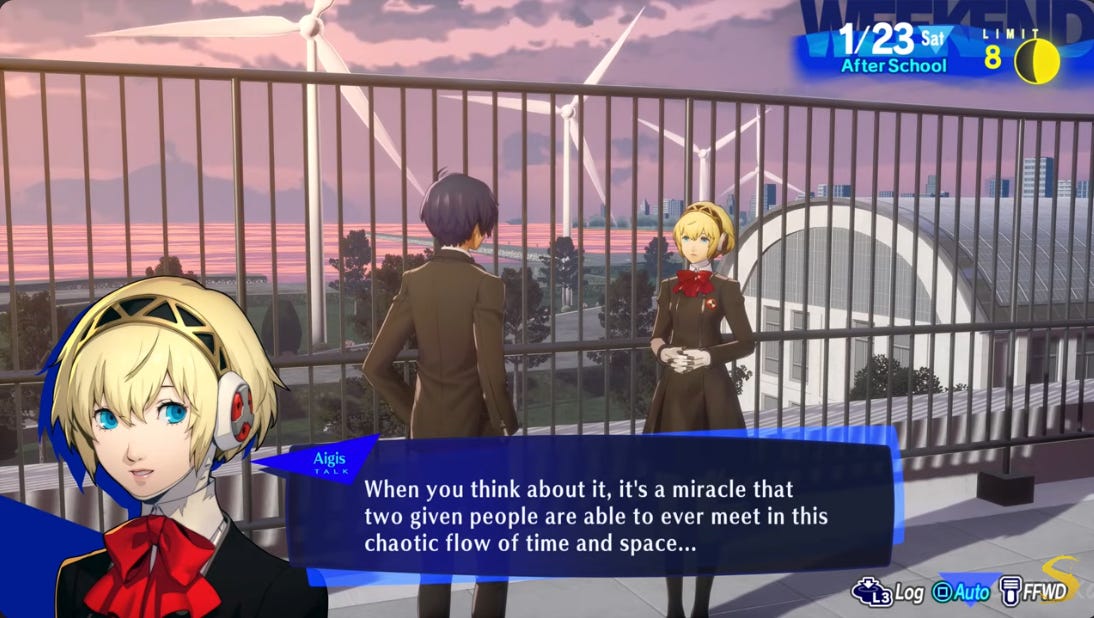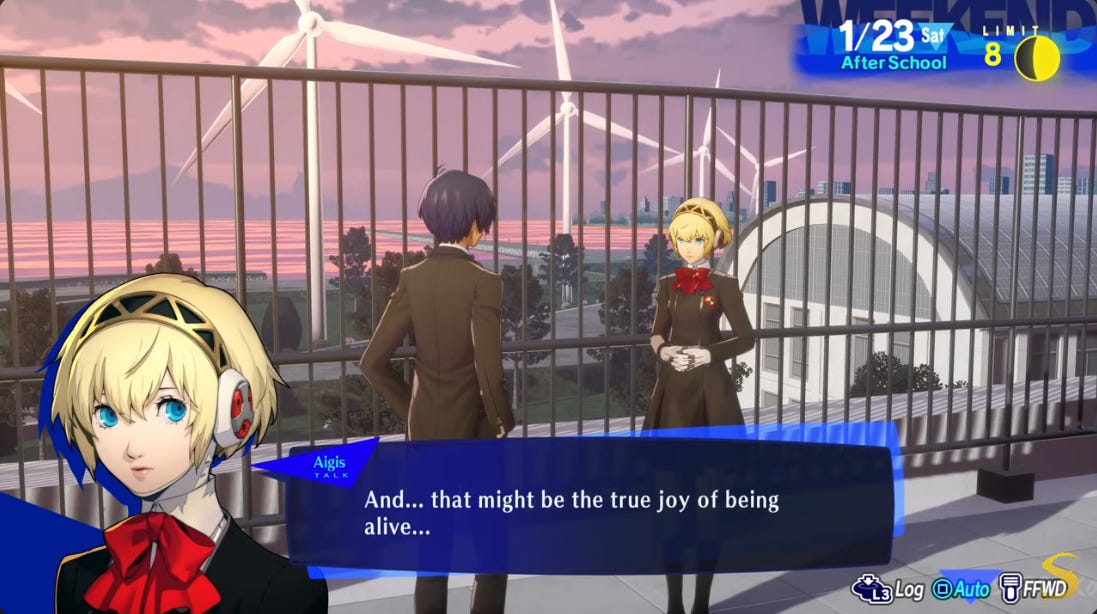Persona 3 and facing mortality
How Persona 3 manages to convey its bleak themes with a positive outlook for the future and humanity
This article will contain spoilers about all Persona 3 iterations.
For the last two weeks, I’ve been trying to polish up the draft for this post, only to be swarmed with work all of a sudden. This was supposed to be done much, much earlier but better late than never I guess.
Anyway, as I’m trying to get back into writing about my gaming journey, I thought that I could choose a light and breezy topic to get back into the groove. Well, what better way to do it than writing about the theme of mortality in the hit JRPG game Persona 3 now that “The Answer” DLC is also out, right?
This piece will be more personal than others, because Persona 3 is a game that has always held a special place in my heart, and I need to talk about it.
A short summary: Persona 3 is a JRPG where you assume the role of a transfer student, moving to Tatsumi Port Island to attend Gekkoukan High School. However, within moments of your arrival, a phenomenon called “The Dark Hour” occurs. The Dark Hour is basically a “hidden” 25th hour in the day, which the world except for people with the “potential” are unaware of. Normal people turn into coffins during this hour, and a giant tower appears in place of your school with monsters called Shadows in it. You are recruited into a group called Specialized Extracurricular Execution Squad - SEES for short. This squad’s goal is to investigate this tower called Tartarus, and get rid of the Shadows that threaten the wellbeing of the people.
You are expected to be a normal high school student, make bonds with other people and study for your exams during the day, and fight monsters and climb the tower of Tartarus at night. You need to balance these activities as best as you can while putting a stop to the threat looming on the horizon.
In Persona 3 Portable, the game gives you the option to choose the Female Protagonist as well. This is how I first played through the game many years ago.
I haven’t played Persona 1 or 2 yet, but from what I understand, Persona 3 is the first in the series to incorporate Social Links into the gameplay, and you can see why exactly this is the case as you play the game. Social Links tie so well with the themes of the game, and I will talk about the reason why here.
What Persona 3 means to me
I firmly believe that the effect a piece of media has on you has to do with how much you can relate to it. If you are able to see parts of yourself in the movie you are watching, the game you are playing, the book you are reading, you will be more affected by it. It will stay with you longer and leave a mark on you.
This is what happened to me when I played Persona 3 Portable the first time many many years ago. I played the Portable version because of the option to choose the Female Protagonist (yes, this is why representation matters). Its themes and message resonated a lot with me and it quickly became one of my favorite games. A lot of people don’t like Portable because of its visual novel format, but as someone who is used to it, I didn’t mind. And seeing the difference between the Male Protagonist and the Female Protagonist is always funny to me.

I think the game as a whole could have used more character sprites with more expressions and variety, but as an Ace Attorney fan, my standards are ridiculously high when it comes to expressive character portraits.

Memento mori and carpe diem
Persona as a franchise is a very interesting one to me. From the outside, it is a “weeb” game franchise with anime characters and cringy fanservice. The fandom is weird, just as any other fandom on the internet, and does a fine job of leaving a bad impression on newcomers. However, at the game’s core lies a thorough research done into Jungian analysis which is where the whole Persona and Shadow concepts come from. There is also a deep inspiration from different cultures and their deities, and even tarot cards.
I find it unfortunate that these more nuanced parts of the Persona franchise are generally buried under the more “infamous” parts of the games. This is, if you ask me, the biggest weakness of the franchise. And Atlus themselves are not doing themselves any favors by giving you the option to have your female characters wear bikinis during battles or putting a weird hot springs scene in every single game.
Despite these shortcomings, Persona 3 manages to dive into deeper and darker topics with an elegance I wasn’t expecting. The game’s catchphrase is “Memento Mori”, which basically translates to “Remember that you die”. The game does a phenomenal job of treating this theme with utmost care.
You can tell that they wanted to try something different with this game. The integration of Social Links, being able to create different Personas in accordance with how strong your Social Links… These are novel ideas that I appreciate and I think it works so well with the theme of Carpe Diem, “seize the day”. As someone who played through Persona 4 Golden, and currently playing Persona 5 Royal, I think the Social Links concept works the best with Persona 3. Not that the others are bad, but it is obvious that the links are treated more like a feature that the fans enjoy instead of being used as a storytelling device to show the “power of friendship”. It is still used well in other games, but I believe that it is most fitting for Persona 3.
As you go through the game, day by day, you start appreciating the little moments you have with the people around you. Making bonds with them, hanging out and making the most of it. These bonds make you stronger and more powerful, and I don’t think the allegory here is lost on anyone. Reload version added even more things to do, and improved on the protagonist’s relationship with his teammates. The characters actually feel like people with flaws, and they all have their moments of weakness where they get into arguments with others, get mad, suffer and lash out.
The characters are thrown into the group not because they are particularly friends, but because they have similar powers and they were sort of pressured to join in. This aspect never goes unquestioned, and many conflicts arise because of this.
Despite all that, it is clear that the cast becomes a tight knit group of friends as time goes by. They become fire-forged friends who do have lives outside of their SEES activities. Each character has their own inner conflict as well, which almost always tie into the theme of death.
They have either lost someone close in the past (Main Character, Yukari, Akihiko, Ken, freaking Koromaru), they lose someone during the events of the game (Akihiko again, Mitsuru, Junpei), they themselves grapple with the very concept of death (Shinjiro, later on Main Character) or what it means to live (Aigis).
Even the DOG gets an arc. We are told that Koromaru has already awakened to his Persona due to losing his owner prior to meeting the main cast. And it is implied that it is not even his first, but his ULTIMATE Persona. This means that he already went through grief and was able to accept the loss of his master and awaken his ultimate Persona. Even if we don’t get a full arc from him, his backstory is just as important as the other characters. And he is the best animal/non-human companion in the franchise, don’t come at me.
The theme of mortality is the most prominent in the Sun Social Link, where you befriend Akinari who is a deathly ill young man. During the Social Link, you explore how to navigate a hopeless situation and it provides an incredible parallel with Aigis’ character development as well: what it means to live versus what it means to die. There is a reason why it is regarded as the best Social Link across the franchise.
Death is a very consistent theme in this game, but despite it all, it is not a bleak game. It is energetic, hopeful, and tries to give you a new perspective on it.
It was never about being a hero and having to make sacrifices for the glory, it is only and only about living life to its fullest and loving the people around you.
The music is one of the biggest contributers to the themes of the game and the biggest mood setter. Listen to this battle theme, doesn’t it just fill you with energy?
BABYBABYBABYBABYBABYBABYBABYYYEAAAAAHHHH 🐸🐸🐸🐸🐸🐸
Anyway…
Listening to Iwatodai Dorm even without playing the game makes me feel relaxed, Color Your Night is so jazzy and cool… All the music is so memorable and in-your-face that even with the dark subject matter of the game, you never feel despair and hopelessness - well, until the last part of the game. But even then, the expectation of hope is there. It is not miserable.
For a game about death, this game fills me with a happy outlook into the future.
Speaking of music, there has never been a song in my almost 30 years of living that brings instant tears to my eyes whenever I hear the first four damn notes of Memories of You.
Literally the first second of the song and a dagger stabs me in the heart.
That’s how powerful the game’s ending was, and how powerful the music throughout the game is. During your last days, the colors of the world are duller and you constantly hear Memories of the School and Memories of the City, which contain the leitmotifs from Memories of You. Whenever I heard those four notes during my playthrough, I was feeling things because I knew it was the end. All that remained, after all that struggle, was the memories we had and the soundtrack perfectly encapsulates that.
To make the player feel such strong emotions with just a few notes is a very big achievement, if you ask me.
Evokers Are Metal As Hell
Does everyone remember the first time they saw the intro where Yukari puts a gun to her head and got a whiplash because that is not what you were expecting? We learn later that it is actually an evoker, basically a fake gun. It is a pretty wild scene to put into the first scene of a game.
The thing is, it is as morbid as you think it is. Yukari at that moment knows that the gun is actually an evoker and won’t kill her. She still hesitates and cannot do it because of her fear of death. We find out later that the evoker basically evokes (hah!) a sense of terror that enables the user to summon their Persona, which is a manifestation of their true self.
(…)The Evoker is a symbol of death, accepting death and knowledge of mortality(…)
On the other hand, when faced with danger, especially seeing other people in danger, the main character doesn’t hesitate to put the evoker to his head. The thing is, MC doesn’t know it’s an evoker the first time he does it. For all the MC knows, it is a gun. He still puts it to his head and pulls the trigger. Now, I do believe that Ryoji inside him knows what it is, and guides the MC to pull the trigger. Still, the fact that he did this with no second thoughts signifies to us that death is not a scary phenomenon for the MC. He doesn’t fear it, and he doesn’t hesitate to take action to protect the others even when it might harm him.
This is a very clever foreshadowing of the events that take place at the end of the game. And it is especially a good indicator of Yukari’s actions in The Answer expansion, where she doesn’t want to accept that the MC has actually died. I will always defend Yukari’s actions in The Answer because this was always how she was written.
Speaking of summoning personas, I think I will always prefer Persona 3’s dramatic flair to the others. P4 and P5 have interesting ideas (crushing a tarot card therefore defying fate, and ripping off a mask therefore showing your true self), but the sheer coolness of the way the summoning is animated in P3 is still unmatched in my opinion.
Power of Friendship Done Right
A common theme in fictional works is defeating the undefeatable with the power of friendship. This is very common in most of the Japanese media that I’ve consumed, and Persona 3 might actually be the best example of this. As the group deals with their struggles with death, loss and grief, and completes with their character arcs, they grow stronger and thus their bonds with each other also become tighter. It is solely thanks to these tight bonds that the Main Character is able to beat the looming threat on the horizon and reach the ending of his story.
And what an ending it is!
Got me crying my eyes out at 3AM and I’m not even ashamed of it.
The main character sacrifices himself (or herself if you are playing as the Female Protagonist) because he has found the answer to life. And the answer is literally the bonds you make with others. The relationships you forge with the others throughout your journey is what gives you, the Main Character, the strength to stand up just as you lose all hope. It serves to prove that we are here thanks to the people around us, to show us that we are saved by the bonds we have forged with others, to make us realize that life is all about what we make of it.
Main Character’s friends save him in his time of need. In turn, he saves the world.
But here is the kicker: the MC doesn’t die immediately after his sacrifice.
I feel like that is the most important aspect of his sacrifice: he gets to spend more time with his friends. He gets to see everyone safe and sound. And he gets to essentially say goodbye to all of them.
The universe rewards the MC for finding the answer.
At the end of his time, the last thing the MC sees is the reunion of the people he cared so much for. He sees his friends running to see him again.
And so the Main Character dies happy and fulfilled.
There is even more I want to say but it is getting quite long, so I’ll just leave it there. As I’ve said, this is a pretty personal piece for me and I hope I was able to evoke (hah!!) some positive feelings in you as well as I tried going more in-depth with the themes of the game.
Thank you for reading this far!















Ummm I may have been convinced to play this game with your post! I was always hesitant because I thought I'd get lost jumping into the franchise.
Thank you for sharing a piece of you!